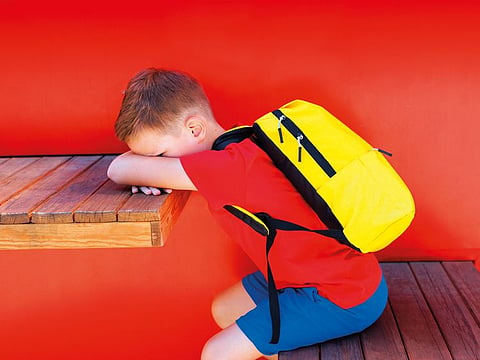Back to school: How to transform anxiety into confidence
Provide emotional support and understanding to make the transition smooth for children

Big life events such as starting a new school term or a new secondary school can be daunting. It is perfectly normal to feel a bit anxious about it. How family, teachers and carers react to that anxiety can make a huge difference to outcomes.
If we are able to talk about it in a calm and confident way, we can mitigate that anxiety. If we ignore it, or overreact we can make a small problem so much worse.
Timing is crucial
How could we help children talk about their fears? Here, a key point is timing. The best time to talk about this is when it comes up as an issue for the child. This might be on the way to school, right in the middle of a group orientation session or some other ‘inconvenient’ moment. If you aren’t practically able to have an in-depth conversation at that time, at least acknowledge their need. Tell them, ‘I see there are a few things on your mind, I can help you with that. Why don’t we fix a time to chat about it after class?’
Trying to force kids to talk about sensitive issues at a time and place or your choosing rarely works, so when you do see they are asking for this kind of attention, don’t ignore it. See it as a teachable moment, and be prepared with your answers.

How to give hope and encouragement
Remind them that change is inevitable. Big changes can feel scary but they are actually an inevitable part of life. Coping with big changes gives people new skills that are valuable throughout their whole life. Stable, comfortable situations are relaxing and make us feel secure, but they don’t really help us grow. Without change we would never learn or become better people. Therefore, it can be helpful to remember that change can be positive because it offers opportunities. These include socialising, learning new skills, becoming more mature and creating new memories.
Encourage them to reflect on eating, sleeping and organisational habits. We all know it is incredibly important to eat and sleep well, and teenagers can struggle with this a lot. Point out that you recognise that this might be easier said than done after months of summer holiday habits! But children should at least try to regulate their routines a week before school starts. That way it won’t be such a shock for them that first morning when they have to rip the covers off and get out of bed early. Having a full stomach will mean they will be more relaxed and personable, helping them make those vital new friends, rather than being the hangry monster that’s hard to socialise with.
Encourage them to help someone else. It’s good to remind children that they are not the only people experiencing first day or first week jitters. Studies have shown that helping other people can reduce our own nervousness. So don’t be afraid to encourage a little bravery. Point out to them that if they can flash someone a smile and ask what their name is, they will not only be helping them by showing some support but also help ease their own worries.
Discourage children comparing themselves to others or putting themselves down. Peer pressure is pretty common at this time of life and it is tempting for children to look at what other people are doing and think they are doing better. One way of discouraging this is to point out that we always have a choice to compare ourselves to others or to compare ourselves to ourselves a year ago. Seeing how much we have matured will make us feel more secure.
Try mindfulness. There are a number of great mindfulness activities that can be learned very quickly to help relieve anxiety in an instant. My favourite one is called The 5 Senses. All you have to do is pay attention to what is around you and try to identify:
● 5 things you can see
● 4 things you can hear
● 3 things you can touch
● 2 things you can smell
● 1 thing you can taste
It only takes a minute and you can do it anywhere anytime without anyone else noticing. Try it now!
Forcing your brain to focus on things in the here and now can create a deep sense of peace and relieve feelings of stress and anxiety.
The writer is a Dubai-based certified family coach and founder of Nava, a coaching company focused on helping teens and supporting parents in the process


